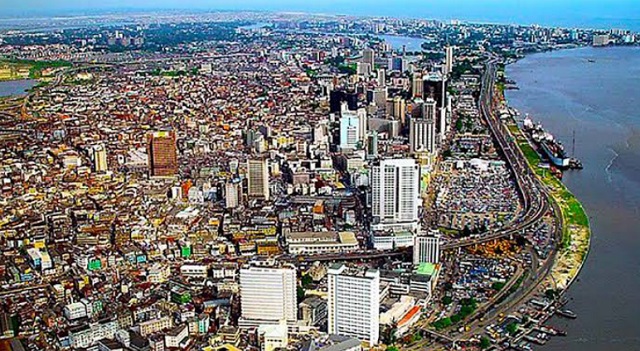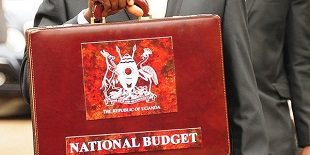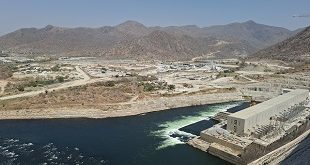 Caption: A crowd of people walking down a street: Nigeria, if it gets its socioeconomic act together, is positioning itself to become Africa’s first superpower. How can this be?© James Marshall/Getty Nigeria
Caption: A crowd of people walking down a street: Nigeria, if it gets its socioeconomic act together, is positioning itself to become Africa’s first superpower. How can this be?© James Marshall/Getty Nigeria
Africa’s first superpower is coming sooner than you think
| SAM HILL | It’s midnight in a medieval palace in the oldest city in West Africa: Kano, Nigeria.
A thousand years ago, this was one of the richest cities in the world, the terminus of the cross-Saharan trade that brought guns and salt to exchange for slaves, gold and ivory. The palace has 5-foot thick walls, floor-to-ceiling bookshelves, stone pathways and ornate mosaic domes. On the walls are large colour photographs of a serious-looking man wearing a white turban with a veil across the bottom of his face. The two tails of the ceremonial knot that holds the veil in place look like bunny ears.
The man is Muhammadu Sanusi II, the 14th emir of Kano, the second most important religious position in Nigeria. I watch as his assistant crawls across the carpet on his hands and knees. Bowing his head to the floor, he hands my business card up to the emir, then crawls away backward. Sanusi motions me to sit.
I’m here to find out what the future holds for Nigeria. I’ve been told the emir is one of the “three or four” people who may know the answer. It’s an important question, and not just for Nigerians. In 30 years, Nigeria will be, by population, larger than the U.S. By the end of the century it will be the third largest nation in the world, behind India and China, and the most densely populated large country, with more people per square mile than even India. It will have more Muslims than any other country in the world, and more Christians. And if it can get its socioeconomic act together, it may also be the first superpower in the Southern Hemisphere. It’s got a tremendous number of advantages that should help it do that: resources, scale, talent, work ethic and a democratic government, but it has an equally long list of challenges.
I’m hoping Sanusi can tell me which will win out.
The emir has a degree in Sharia, Islamic law. He also has a master’s in economics. Before becoming emir, he was head of the Nigerian equivalent of the Federal Reserve. His reform agenda was so aggressive it was known as the Sanusi tsunami. It earned him recognition as the top central banker in the world. He has an equally ambitious agenda for his emirate. I listen as he describes a future that has stronger rights for women and children; he also explains how to use education and child support laws to end child marriage and slow population growth. He talks about modernising agriculture and investing in its value chain. Can it happen?
State of the State
When you’re standing on a dusty street ankle-deep in trash, watching young men load a cart with 20-litre jugs of water that they will sell door to door to homes that lack indoor plumbing, it’s not easy to envision Nigeria as a superpower. Expectations for the country have been high before: just after independence in 1960 and during the `Africa Rising’ enthusiasm of a decade ago.
And yet, despite having had so much going for it, Nigeria has remained stuck near the bottom of the indexes used to compare nations—social progress, human development, peacefulness, governance, innovation, fragility, corruption and ease of doing business—while Asian nations have taken off. Nigeria is not a failed state, but neither is it a successful one. Oge Onubogu, who leads the Africa programs at the U.S. Institute of Peace, says, “Nigeria lurches from one crisis to another, but whenever you think it’s about to topple over, it pulls itself back.”
It’s in one of those crises at the moment. Yemi Koyejo of the Nigerian-American Multicultural Council in Houston says that all Nigerians want is “a decent life.” She says this comes down to basic services. “It’s really bad right now in Lagos, and if it’s bad in Lagos, imagine what it’s like in the rest of the country. The average person wants shelter, security, health care and electricity.”
Meanwhile, the population is exploding, growing more than twice as fast as the world average. That is especially true in the North, where fertility rates are typically around seven children per woman. Except in Lagos, local governments struggle to collect taxes and provide basic services. “Middle class” is defined as the ability to afford bottled water and a generator. Even more worrying to most Nigerians is the security situation. On average, seven middle-class Nigerians and oil field workers are kidnapped and held for ransom every day. Only a few years ago, most people made the short trip from the capital Abuja to Kaduna by road. Now, most go by train. At Christmas, an ISIS offshoot of Boko Haram released a video showing 10 Christians being beheaded in Maiduguri. Every conversation about traveling ends with two words: be careful. Amenities in luxury condos include bulletproof glass.
Most say that the security situation is linked to the economy and that those who commit cyber fraud, extortion, piracy and robbery do so because they have no legitimate way to participate in the economy. They are entrepreneurs of violence. “If you have something at stake, you won’t be enticed to wear a suicide vest,” says Fareedah Yahuza Yashe, who runs the Community Engagement and Social Development Initiative. (CESDI is a nongovernmental organisation in Maiduguri that helps female victims of the militant group Boko Haram.)
It’s hard to make progress anywhere, but it’s particularly hard in Nigeria. A complex set of policies and agreements keeps the peace between Nigeria’s many constituencies—a population of over 250 ethnicities split evenly between Muslims and Christians. In practice, that makes it hard to get anything done. A bill to increase transparency in the oil industry has been stuck in the National Assembly for 19 years. And many are resistant to change. In 2014, Sanusi was fired from his banking post for exposing corruption. Soon after his appointment as emir, Boko Haram suicide bombers and gunmen attacked the mosque next door to the emir’s palace, killing over 120 people. Now, the governor of Kano state and a frequent target of Sanusi’s criticism, Abdullahi Ganduje, wants to break up the emirate to reduce Sanusi’s power.
Many of the issues, and much of the gridlock, come back to oil. Roughly $100 million worth of oil pours out of the ground each day. Spread across that huge population, that’s only about 50 cents per person per day. That’s not enough to make everyone rich, but more than enough to make some very rich. It’s estimated that 80 percent of the proceeds from oil has gone to 1 percent of the population. It’s money worth fighting over, and that’s what Nigerians do at every level of the economy. Oil has given politics an outsized importance. As Onubogu says, “If you’re excluded from politics, you’re excluded from the economy.”
Oil accounts for 97 percent of Nigeria’s official exports. Over the past 21 years, the benchmark price of oil has roller-coastered between $17 and $145 per barrel. High oil prices have encouraged fiscally irresponsible policies, like excess spending, vanity public works, subsidised imports of refined petroleum products, currency manipulation and high levels of protectionism. During boom times, Nigeria splashed around oil money hosting international events like the 2003 All-Africa Games. It spent on grandiose projects like the Moshood Abiola National Stadium in the new national capital of Abuja and the Nigerian space program, which has now launched five satellites. During periods of low prices, Nigeria has been forced to borrow.
Oil has also been ruinous for the environment. Although progress has been made, there’s a long history of less than best practices by international companies, like gas flaring, which contributes significantly to climate change, as well as the environmental disasters caused by bandits who steal oil from pipelines and entrepreneurs who operate illegal (and dangerous) kerosene and diesel refineries and dump their waste product into the land and waterways.
 The Independent Uganda: You get the Truth we Pay the Price
The Independent Uganda: You get the Truth we Pay the Price


